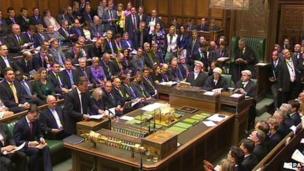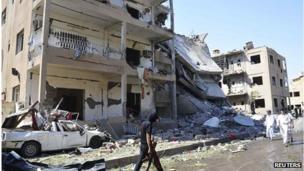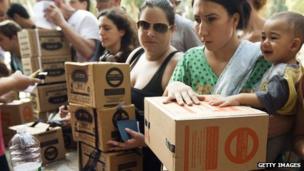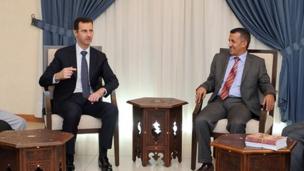Syria’s Bashar al-Assad will fight Western ‘aggression’
1 hour ago
Syrian President Bashar al-Assad has said his country will defend itself against Western aggression, as the UK and US seek support for intervention.
The five permanent Security Council members held a short meeting, but diplomats said they were “far apart”.
The US and UK say the Assad regime killed hundreds in recent poison gas attacks. Damascus, backed by Russia, blames the attacks on rebels.
UN chemical weapons experts are in Syria investigating the attacks.
They are due to finish their work on Friday and give their preliminary findings to UN Secretary General Ban Ki-moon at the weekend.
Samples taken during their site visits will be tested in various European laboratories.
It is unclear when the inspectors’ final report will be released. The UN has said the tests will take “longer than days”.
Their mandate does not involve apportioning blame for the attacks, which took place in eastern Damascus on 21 August and left at least 355 dead.
‘Unanimous reaction’ urged
The UK pushed for a UN Security Council resolution facilitating the use of force on Wednesday, but no agreement was reached.
The five permanent members ended their meeting after less than an hour.
A diplomat told the BBC that there had been “no meeting of minds”, with Russia and China on one side, and the US, UK and France on the other.
Russia, which has twice blocked resolutions condemning Mr Assad, called the meeting.
Analysts say Moscow is unlikely to agree to any resolution approving the use of force in Syria.
Russia has close ties with the Assad government, supplying its armed forces with weapons and housing its warships in Syria’s ports.
Earlier, German Chancellor Angela Merkel spoke to Russian President Vladimir Putin over the phone to urge Russia to help the Security Council frame a “quick, unanimous international reaction”.
However, the British prime minister’s officesaid in a statement that the UK could still take “exceptional measures including targeted military intervention” on humanitarian grounds, even if the Security Council could not agree.
British MPs will vote later on a motion that backs the principle of military intervention and says “a UN process must be followed as far as possible”.
US officials are expected to brief senior Congress politicians later on the evidence against Mr Assad’s government.
White House spokesman Josh Earnest strongly denied comparisons between potential US action in Syria, and the 2003 invasion of Iraq.
“What we saw in [Iraq] was an administration that was searching high and low to produce evidence to justify a military invasion,” he said.
“What we have seen here, tragically, is a preponderance of evidence available in the public domain that the Assad regime used chemical weapons against innocent civilians.”
He insisted that the US was not contemplating “regime change” in Syria, and any intervention would be “very discrete and limited”.







Mr Assad told a group of Yemeni MPs that Syria would defend itself against any aggression, according to Syria’s Sana news agency.
“Syria, with its steadfast people and brave army, will continue eliminating terrorism, which is utilised by Israel and Western countries to serve their interests in fragmenting the region,” he said.
In Damascus, senior military commanders are reportedly staying away from buildings thought likely to be targeted.
Many Damascus residents have fled the city in fear of an impending attack.
Long lines of cars loaded with suitcases have been waiting at the main Masnaa border crossing into Lebanon.
But state television is portraying citizens going about their normal lives, seemingly unperturbed by the prospect of military strikes.
More than 100,000 people are estimated to have died since the conflict erupted in Syria in March 2011, and the conflict has produced at least 1.7 million refugees.
Forces which could be used against Syria

- Four US destroyers – USS Gravely, USS Ramage, USS Barry and USS Mahan are in the eastern Mediterranean, equipped with cruise missiles
- Cruise missiles could also be launched from submarines, including a British Trafalgar class boat; HMS Tireless was reportedly sighted in Gibraltar at the weekend
- Airbases at Incirlik and Izmir in Turkey, and in Jordan, could be used to carry out strikes
- Two aircraft carriers – USS Nimitz and USS Harry S Truman, along with escort ships, are in the wider region
- The Royal Navy’s response force task group – which includes helicopter carrier HMS Illustrious and frigates HMS Montrose and HMS Westminster – is in the region on a scheduled deployment
- RAF Akrotiri airbase in Cyprus could also be used
- French aircraft carrier Charles de Gaulle is currently in Toulon in the western Mediterranean
- French Raffale and Mirage aircraftcan also operate from Al-Dhahra airbase in the UAE













